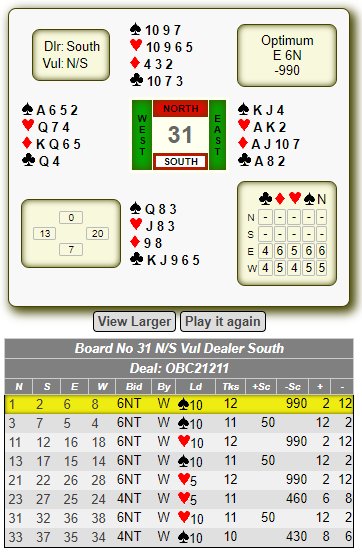
This was played in the club's annual "individual" event, There were 32 players, and we played 31 boards, with each pair playing together once. To avoid system discussions, we were all obliged to play the same agreements, and issued with a card for simple Acol. This was our last board of the event.
The bidding was
| South | West (me) | North | East |
| — | 1N (a) | — | 6N (b) |
| — | — | — |
(a) 12-14.
(b) A quantitative 4N would be better, but was not permittted by the system card.
I have 10 solid tricks, and can hope for more from (1) the spade finesse, (2) a 3-3 spade split, and (3) the club queen, if South has the king and doesn't play it when I lead low from dummy.
If I try the spade finesse first and lose to the queen, then South will know to win his club king when I lead a small club from dummy. So I tried for the club trick first, got away with it, and tried the spade finesse which failed. But spades were 3-3, so I had by 12 winners. I played the diamonds carefully, and for trick 13 I led the 6 to dummy's 7.
So, on the 403rd and final trick of the session, I simultaneously made a slam and a beer – a most satisfying end to a long day.
You will see that the double dummy solver says E can make 6NT, but W can't. Playing double-dummy, the only thing that can defeat 6NT is a club lead from N. Supposing you get, say, a heart lead, you can guarantee the slam like this: cash three rounds of hearts, three rounds of diamonds (keeping the 7 and 6), and the A K of spades. Now play a third round of spades. S will win with his Q, but will than have to lead from K J 9 6 of clubs, into your Q 4 with W and A 8 2 with E. So you'll win the last four tricks with A and Q of clubs, the long spade, and the d7.
This is one of a few hands I've particularly enjoyed, listed here.